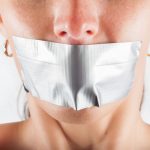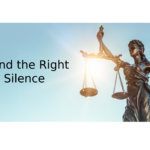No More Right to Silence – Police Questioning

The NSW parliament recently passed two pieces of legislation designed to:
(1) water down a person’s right to silence when being questioned by police, and
(2) require the defence to disclose its case in the lead-up to a criminal trial.
This blog deals with the first piece of legislation, called Amendment of Evidence Act 1995 No 25 (NSW) which passes the Evidence Amendment (Evidence of Silence) Bill 2013.
Before the Act was passed, a jury could not draw an adverse inference from a person’s silence when being questioned.
So, for example, if you were arrested and taken to a police station and exercised your ‘right to silence’ the jury couldn’t later use this to infer that you had something to hide, and are probably guilty.
As outlined in Sydney Criminal Lawyers®’ earlier blog titled ‘Criminal Lawyers Against Proposed Dilution of Right to Silence’, the importance of the right is supported by decades of studies which have found that:
‘arrested persons will frequently give untrue statements to ‘appease’ (satisfy) arresting police, or to ‘expedite’ (speed up) the arrest/charge process, or to protect family or friends, or to increase the likelihood of being released from the police station on ‘bail’, or simply due to fear or acute anxiety.
The ‘evidence’ derived is often non-sensical but can also be highly incriminatory.
The ‘right to silence’ ensures that arrested persons will not be punished for choosing not to speak under such unsatisfactory conditions.
It is an extremely important safeguard that not only protects individuals, but decreases the likelihood of unreliable evidence entering and being relied upon in criminal proceedings.’
The new Act changes all of this.
Its says that juries can now draw adverse (negative) inferences against a person for remaining silent when being questioned by police.
So, for example, if you were arrested and felt you were much too nervous or scared or tired to answer police questions, or were worried you might accidentally say something wrong etc, that silence can now be used by juries to reach the conclusion that you are lying and are guilty.
Also, if a person participates in an interview but fails to raise a particular defence (eg duress, necessity, diminished capacity etc) and this defence is later raised, the jury can reach the conclusion that the person is just ‘making it up’.
This is very dangerous for many reasons. One of those reasons is it assumes that the person knows about a particular criminal defence and it’s potential future importance. Many people don’t know about available defences to particular criminal charges – nor should they be required to know, after all they’re not criminal lawyers!
It should be acknowledged that the Act contains an important safeguard – that the adverse inference can only be drawn if the police caution ‘was given in the presence of an Australian legal practitioner’.
So what does all this mean?! What will be the effects?
There will be a number of effects:
1. Arrested persons will be far more likely to speak with police when told that ‘it may harm your defence if you don’t mention something that you later rely upon’.
This, in turn, will mean that:
2. Arrested persons will end up saying things when nervous, scared, under pressure or to satisfy police (eg so they can be released from the police station on bail).
As decades of studies have found, these ‘admissions’ are frequently unreliable, inaccurate, incorrect, result from misunderstandings etc.
So, ‘you’re damned if you do and you’re damned if you don’t’!
In other words, if you remain silent this can be used against you at trial.
But if you participate in an interview and say things that can interpreted in several (adverse) ways, or result from extreme pressure, or are simply untrue or inaccurate, this can also be used against you.
In relation to the ‘safeguard’ (ie that cautions must be given in the presence of a lawyer), this has 2 major problems:
1. The arrested person will likely have already ‘blurted out’ information when intially arrested and told by police that any failure to speak could later be used against her / him. That information can, of course, be later used in court; and
2. It will keep lawyers from attending police stations – which will make police very happy but take away a person’s ‘protective shield’. This will further increase the pressure police are able to exert on arrested persons and, in turn, increase the likelihood they will ‘speak to police’ and make ‘unreliable admissions’.
I’m sure many police officers will be rubbing their hands together, saying ‘we’ve got’em now!’.






